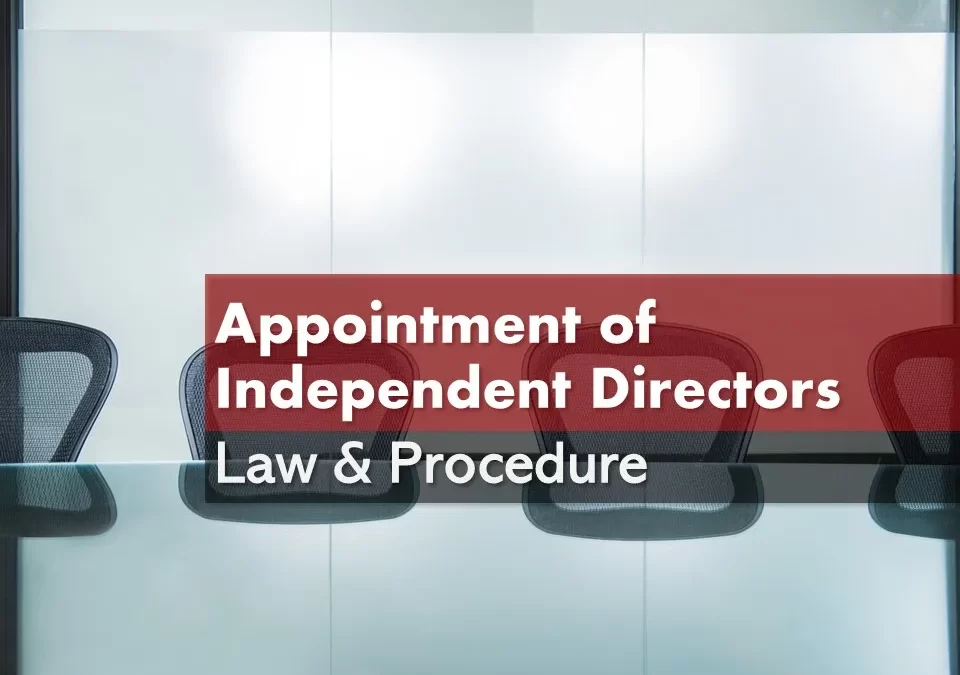Qualifications
Independent directors are directors of a company.
Independent directors are subject to the same general requirements and disqualifications as any other director.
The 2013 Act specifies specific qualification standards for independent directors in addition to those outlined in the Listing Agreement.
An independent director must be a subject matter expert with the necessary qualifications in the domains of finance, law, management, research, and corporate governance.
He must be a person of moral character, faith, honesty, and appropriate experience. Additionally, he should not be a promoter of the business or any affiliated businesses, or even a relative of any promoters or board members.
In addition, he must not have any financial ties to the corporation, its holdings, subsidiaries, or promoters.
He must, thus, be a person in order to be selected as an independent director.
He must be qualified to serve as a director and provide assurance that he is not ineligible. In order to serve as a director, he must also submit his written approval, which must be filed with the Registrar, and declare his director identification number (DIN).
The New Act prohibits the appointee from being associated with the promoter or directors of the company, its holding, subsidiary, or associate company, whereas, the listing agreement prohibited the appointment of a person in relation to the promoters or persons possessing management positions at the board level or one level below.
The new Act does not require the appointment to be unrelated to someone holding managerial positions at the board level or one below the board, unlike the listing agreement, and it can be deduced from this.
Companies must adhere to the standards under both until the regulations developed in this respect give further clarity since the new Act does not supplant or replace the listing agreement.
While the Listing Agreement does not contain any strict rules about the potential appointee’s family, the new Act stipulates that neither the independent director nor any of his kin may:
- Hold a significant managerial role or had worked for the business during any of the three financial years;
- Has participated in any of the three financial years as an employee, proprietor, or partner;
- Holds 2% or more of the company’s total voting power;
- Belongs to any non-profit organisation whose chief executive officer or director obtains 25% or more of its revenues.
While the new Act stipulates that an independent director must possess honesty, the necessary knowledge, and the necessary experience, it does not specify the criteria to be used in deciding whether a person satisfies these requirements.
The ultimate effect is that listed corporations eventually nominate independent directors after using their own discretion.
It is important to note that, in contrast to the 2013 Act, the listing agreement does not define the term “a person with integrity and holding the necessary skills and experience” when describing the individuals eligible to be selected as independent directors.
This provision is not present in the Listing Agreement. These constraints aim to ensure that independent directors do not act against the financial or pecuniary interests of the firm. There may be a need to review the selection criteria for independent directors at many listed companies.
Importance of DIN
Director Identification Number (DIN ) and its importance
Section 152 of the companies Act makes it compulsory for the directors to obtain a unique identification number. The provisions pertaining to Director Identification Number are set forth under section 153 and rule 9 of the Companies (Appointment and Qualifications of Directors) Rules, 2014.
Director identification numbers facilitate the government in maintaining a database. Every person intending to be a director or every person who is already a director in a company shall be allotted a single number irrespective of the number of directorships he holds.
The DIN is valid for a lifetime. After receiving the DIN, the director within a month must inform about the same, to all the companies where he holds or intends to hold the position of director.
The company on receiving the DIN must inform about the DIN of the director within 15 days to the Registrar of Company.
The detailed procedure and the requirements for the application of DIN are provided under rule 9 of the Companies (Appointment and Qualifications of Directors) Rules, 2014. While allotting and scrutinizing for DIN, Rule 10 of the Companies Rules 2014 (Appointment and Qualification of Director) is also considered.
Ministry of Company affairs , Government of India databank
Data Bank of Independent Directors
In order to strengthen good corporate governance, the ministry of corporate affairs launched Databank for independent directors.
The databank maintains a database of the independent directors that are willing to take up the post of an independent director and is also eligible for the post.
The data bank facilities the selection process of independent directors by the company as can select the per their requirements.
Indian Institute of Corporate Affairs has been authorised by the central government to create and to maintain a data bank for independent directors. The data bank is an online data bank displayed on the website of the institute.
The provision relating to the details required by the databank is provided under the companies (creation and maintenance of databank of independent directors ) Rules 2019.
Accordingly, the following details of certified Independent director can be seen by companies :
- Director identification number (DIN)
- Full name
- Income tax PAN
- Fathers name
- Date of birth
- Gender
- Nationality
- Occupation
- Present and permanent full address along with PIN code
- Phone number
- Email id
- The educational qualifications and professional qualifications
- Details of experience or expertise (if any)
- If any pending criminal proceedings
- Details of the limited liability partnership which he is a part of:
- List of the limited liability partnerships,
- The names,
- Nature of the industry of the limited liability partnership,
- The duration along with the dates,
Details of the companies he is part of:
- The Name of the companies.
- The nature of the industry.
- The duration along with dates.
- The nature of directorship i.e whether he serves as an independent director or an executive director, or nominee director, or a managing director.
The data shall be provided by the institute on payment of a prescribed fee by the company. Indian Institute of Corporate Affairs shall not be held responsible for the lack of accuracy of any information.
As mentioned earlier it is the responsibility of the company to conduct due diligence on the prospective independent directors.
How Indian Institute of Corporate Affairs Certifies Independent Directors
How Indian Institute of Corporate Affairs Certifies Independent Directors
Any person who has been appointed as an independent director or who intends to hold the position of an independent director, the institute shall comply with the following:
- Conduct a competency self-assessment test with the curriculum covering subjects such as basic accountancy, company law, securities law, and other areas relevant to the functioning. The test would be conducted online.
- Assemble the required study material for individuals appearing for the above-mentioned assessment. The study material will be in the form of online lessons or audiovisuals.
- Provision for individuals to take an advance test for the areas specified above and prepare the study material for the same.
Tenure
Tenure of Independent Directors
The duration of the term of office for independent directors has been set forth under subsection (10) and subsection (11) of section 149 of the Companies Act,2013.
According to section 149(10), an independent director can be appointed for a term up to 5 consecutive years.
This was clarified by the Ministry of Corporate Affairs via its General Circular 14/ 2014, stating that the appointment of an independent director for the term of 5 years or less is permissible. Whether the appointment is for five years or less, it will be considered as one term.
The independent director under this section shall be eligible for reappointment through the passing of a special resolution and the disclosure of such information has to be made in the board report.
Furthermore, section 149(11) states that no person shall be appointed as an independent director for more than two consecutive terms. Although such independent directors shall be eligible for reappointment after the expiration of 3 years.
The person shall have to resign from the office on completion of two consecutive terms even if the aggregate number of years is less than 10, as clarified by the Ministry of Corporate Affairs via its General Circular 14/2014.
Retirement by Rotation : Unlike other directors, the independent directors shall not be liable to retire on rotation as provided by subsection (13) of section 149.
Manner and selection
Manner and selection of independent directors
Provisions pertaining to the appointment of independent directors are set forth under section 150, section 152, part IV of Schedule IV.
Selection of independent directors
The main aim of appointing an independent director is that the appointed person should be impartial and help with good corporate governance. The manner in which an independent director shall be appointed has been laid down under part IV of Schedule IV of the Companies Act 2013.
Part IV clause (1) of Schedule IV states that the appointment of an independent director should be free from any company management. The board of directors shall appoint an independent director, however, the board while appointing must ensure that there is a balance between skills, knowledge, and experience in the board. Doing so will facilitate the board to administer their roles and duties efficiently as provided under section 150 (1).
Therefore the board may nominate the person to be appointed as independent directors. The board has also been given an option to select an independent director from the data bank that has been maintained. The data bank might be anybody, associate as notified by the central government. The responsibility of conducting due diligence before appointing an independent director shall be of the board.
Approval
Approval
The board nominates person(s) for the post of independent director. However, the appointment of the independent director should be approved in the shareholders meeting ad provided under Part IV clause (2) of Schedule IV.
Section 150(2) states that the appointment of an independent director must be approved in the general meeting held by the company. Additionally, an explanatory statement must be attached to the notice of the general meeting. The notice must provide the justification for selecting the said independent director.
Furthermore, Section 152(5) also requires the explanatory statement to specify that in the opinion of the board, the independent director fulfills the conditions laid down under this Act and its rules.
Appointment letter
Appointment Letter
The appointment of the independent directors must be formalized by a letter of appointment. The letter of appointment shall mention the following things listed below (as specified by Part IV clause (4) of Schedule IV.):
- The tenure of the independent director.
- Expectations of the board and the board level committee(s) in which the independent director is expected to serve.
- The fiduciary duties and the corresponding liabilities.
- Provisions of director and officer insurance.
- The code of business ethics to be followed by its directors and employees.
- List of prohibited actions when functioning as such in the company.
- The remuneration, periodic fees, provision for reimbursement of expenses and profit related commissions; if any.
The terms and conditions of the appointment of independent directors must be posted on the company website and must be made available for inspection at the company’s registered office(during business hours) as provided under clause IV (5)(6) of Schedule IV.
Consent
Consent
Every person who has been appointed to hold an office as an independent director must give his consent to act as an independent director and the said consent must be filed with the registrar within 30 days as provided under Section 152 (5) of the Act.
Furthermore, the independent director must furnish the consent in writing on or before his appointment in Form Dir 2 in conformity with rule 8 of Companies ( Appointment and Qualification of directors) rules, 2014.
Re-appointment
Re-appointment
According to clause V of Schedule IV, the independent directors shall be re-appointed based on the performance evaluation report.
Resignation
Resignation
For various reasons, an independent director may resign from the position by giving the board written notice of his intention to do so and providing a plausible explanation for why he is unable to maintain his position. As per the Companies (Registration Office and Fees) Rules, 2014, he must also give a copy of his resignation letter and an explanation of his reasons for leaving within 30 days to the Registrar of Companies. Upon receiving a resignation notice, the board is required to take note of it and notify the applicable stock exchange, as well as the Registrar of Firms in the case of listed companies. Additionally, they must provide information on the resignation in the board report that is distributed to the company’s next annual general meeting. The resignation is effective only on the day the company receives the notice of resignation—or any later date that may be specified in the resignation letter.
When a director tenders his resignation and the Board of Directors accepts it and takes action on it, the director is no longer responsible for any liabilities the company may incur after the date of acceptance of his resignation, with the exception of the liabilities he personally incurred when he bought shares of the company. Directors who resigned and submitted their resignations to the Registrar of Companies (ROC) before the relevant time during which the alleged offences occurred should be granted relief.
However, at this time, these explanations must be specific in their resignation letter due to the increased obligations and consequent responsibilities. The resignation letter of an independent director is a public record that may be cited as prospective evidence in a lawsuit or an inquiry to establish compelling reasons for the resignation. It can serve as a useful tool for the director to reduce his exposure and justify his stance before resigning. A fresh appointment must be made as an independent director within 180 days of the resignation date.
Resignation may only be withdrawn or revoked, prior to the resignation’s effective date, which is the later of the day the firm receives the notice of resignation or the date mentioned in the resignation notice. In Union of India v. Shri Gopal Chandra Misra and Others (1978), the Supreme Court of India ruled that an incumbent’s written notification to the appropriate authority of his intention or proposal to step down from his post as of a future specified date may be withdrawn by him at any time before it becomes effective, barring any legal, contractual, or constitutional restrictions. The case of Yamaha Motors (Pvt) Ltd. v. Labour Court-II and Another (2012) also adopted a similar approach. It was emphasised that a potential resignation may always be revoked prior to going into force, although it would always be subject to the employee’s service conditions.
Since just resigning and absolving oneself of duty cannot be done, there should be some guidelines. Resignations based only on vague personal reasons cannot be accepted in order to leave one firm just to serve others.
Removal
Removal
Like any other director of the corporation, an independent director may be dismissed from the board.
They can be dismissed before their term ends by passing a regular resolution that is supported by the majority of the members.
The independent director must have a fair chance to be heard before being removed.
However, a director chosen by proportional representation cannot be dismissed before the end of his tenure.
Specific notice must be introduced at the meeting when a director is to be dismissed.
The resolution voted in the Extraordinary General Meeting (EGM) to remove the directors was deemed invalid since no particular notice of the vote to remove the directors was given.
To provide the concerned director with a chance to voice his views, the corporation must also submit a copy of the document to him.
The concerned director may also ask for more time to send his representative or a lawyer. In the event of a time constraint, the director may address the matter at the scheduled meeting.
However, if the company or another individual file a claim with the National Company Law Tribunal (NCLT) claiming that doing so would amount to securing unwarranted exposure for defamatory material, such representation may not be read out at the meeting.
With a majority vote, shareholders may also dismiss a director with or without cause. However, if two-thirds of the directors were chosen by proportional representation, this option would be unavailable. If any compensation or damages are due to the dismissed director under the conditions of his appointment as director, they might have to be paid.

Author Sa. Venkat Ramanujan is a Certified Environment Social Framework Specialist of Word Bank Group and also Certified Independent Director of IICA, Ministry of Corporate affairs , Govt of India.
He is Member of Institute of Directors & All India Management Academy ( AIMA ),
He is Founder & CEO of Trust Infosys Incorporation – Govt. of India accredited startup venture, A distinction holder in his Post graduate MBA studies and a sustained learner for three decades in the domains of engineering & infrastructure projects , international trade & contracts , data & cloud management , environmental, social & corporate governance.,
Environmentalist, Voracious Reader, Interested in Cats and Dogs, Love Gardening, Reuse & Recycler of Natural Resources,
for more details check in >> venkatramanujam.in





